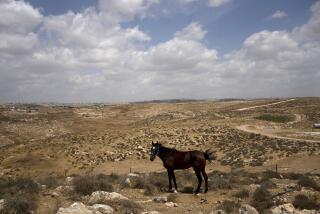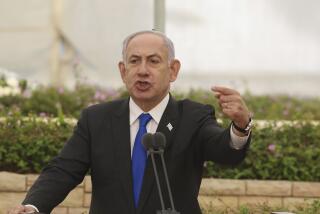PLO Blames Israelis for Delay in Elections : Mideast: Israel says the holdup is due to proposal for a Palestinian Parliament, which deviates from pact.
JERICHO, West Bank — Israel and the Palestine Liberation Organization are trading angry accusations about who is to blame for the delay in holding West Bank and Gaza Strip elections called for in their peace accord.
Both sides agree on one thing: It is growing increasingly unlikely that Palestinian elections will be held before the end of this year.
That means PLO Chairman Yasser Arafat will continue to govern the Gaza Strip and Jericho--and some aspects of Palestinian life throughout the West Bank--with a government that has no popular mandate.
“The Israelis are not serious,” said Saeb Erekat, municipal affairs minister in the self-governing Palestinian Authority. “In the past, they accused us of not wanting elections. But they are obstructing the elections now.”
But Yossi Beilin, Israel’s deputy foreign minister, said: “Mr. Erekat is suggesting to elect a Parliament. That is in contradiction to our agreement, and that is going to create a very big delay to the elections. If elections are very important to people like Saeb Erekat, and I believe that they are, then he should remove the obstacles to elections.”
Erekat, charged by Arafat with running the committee designing the Palestinians’ first general elections, said he handed plans for elections to Israeli negotiators Aug. 16 and 17. His proposals--which have not been made public--reportedly call for the Palestinians to elect a 124-member governing council Dec. 15.
“They said that they will study our papers and get back to us, but they haven’t responded to us on even when to have negotiations on elections,” Erekat complained. “They don’t want to have elections, because they don’t want to redeploy their forces on the West Bank and they don’t want to give this government the popular mandate that it needs.”
But Hannie Jerushun, spokeswoman for Danny Rothschild, Israel’s chief negotiator with the Palestinians, retorted: “Yasser Arafat only wants to have elections that he knows he can win. We have not responded because there are things in their proposals that we do not accept and because the time is not right to discuss these things. This process must be done step by step.”
Oded Ben-Ami, spokesman for Prime Minister Yitzhak Rabin, observed that “we told Mr. Erekat, and we told the Palestinian Authority, that we are not going to jump to the next step before the previous step is completed.”
Ben-Ami said Israel has no intention of beginning talks about Palestinian elections until Jerusalem transfers to the Palestinians authority in the West Bank for five areas of civilian life. The date for that transfer has not been set, he pointed out, although Palestinian negotiator Nabil Shaath said last month it will be completed next Monday.
The election raises temperatures on both sides because the timing, structure and outcome are considered critical to the success of the still-fragile Palestinian-Israeli accord. Neither side wants to be seen as obstructing formation of a democratic government in the territories, but both are aware that the election process is fraught with political risks.
“Realistically, I don’t think elections will happen before next spring, but I want them to happen tomorrow,” said Khalil Shikaki, a political science professor at An-Najah University in Nablus and a member of an independent Palestinian group preparing its own election plan for the territories. “I want elections because I want accountability.”
The committee Shikaki is working with is “very close” to completing a plan calling for Palestinians to elect an 80-member legislative body and a 20-member executive body, he said.
He said that opposition organizations, including Hamas, a militant Islamic group, and the Democratic Front for the Liberation of Palestine, a leftist organization, have indicated a willingness to participate in the kind of elections Shikaki’s committee is promoting.
Shikaki criticized Erekat for submitting election proposals to Israel that have not been published in Palestinian newspapers or debated within the Palestinian community. “How can you start negotiating with the Israelis on elections,” he asked, “when you have not even built a Palestinian consensus on your ideas?”
Under the agreement that Israel and the PLO signed in Washington on Sept. 13, 1993, elections already are overdue. That declaration of principles stated a goal of holding “free and general elections . . . no later than nine months after the entry into force of this declaration.” Technically, that meant elections should have been conducted by June 13.
But it took Israel and the PLO much longer than expected to agree on implementing the first phase of their accord--Israel’s pullout from Gaza and the West Bank--and transfer of authority there to the Palestinians. Israel only pulled out of Gaza and Jericho in May.
Since then, the Palestinian Authority has struggled to build a government to manage daily affairs in the crowded strip and in Jericho. It has also been engaged in often-acrimonious talks with Israel over transfer of some authority in the rest of the West Bank to the Palestinians.
The two sides agreed just last month in Cairo to transfer five spheres of civilian life in the West Bank to the Palestinian Authority; only one--education--has actually been transferred.
The next step in the process, the Israelis say, is securing funding for the Palestinian Authority--expected to happen this week at an international donors conference in Paris.
The Israelis say they will start negotiations with the Palestinians on Israel’s military redeployment in the West Bank only after they are assured that the Palestinians will be able to pay for services there.
Once Israel transfers civilian functions to the Palestinian Authority, it will be ready to start negotiating redeployment. And once redeployment is agreed on, Israel will start negotiating the election framework, Israeli officials said.
But other hurdles keep getting in the way of preparing for elections. Erekat complained that Israel refused to allow Palestinians to conduct a community survey and district mapping. Israelis responded that they rejected the request because the Palestinians wanted to use a Palestinian company based in mostly Arab East Jerusalem to conduct the surveys.
Israel insists that no function directly connected to the Palestinian Authority in the territories can operate out of East Jerusalem, which Israel regards as an inseparable part of its capital.
The Palestinians insist on involving East Jerusalem, which they hope will one day become the capital of an independent Palestinian state.
“Every day that we delay the (technical) process of preparing for elections is another five days delayed on the actual date of holding elections,” Erekat said. “Soon, we will have to make another announcement of a date. I think it hurts us, the Palestinian Authority, so much to keep delaying.”
Beilin said, “I believe that it is in Israeli interest to have elections. It is the task of those of us on both sides who believe in the importance of elections--because they legitimize the process, because those now opposing the process may accept the Palestinian Authority, if there is a democratic election. It is our task to encourage each other.”
“If the Palestinians agree,” Beilin said, “to elect simply a council and not a Parliament, and if they agree to have East Jerusalemites participate by proxy voting--in other words, if the territory of East Jerusalem is not included in the Palestinian entity--that will make it possible to have elections in a very short while.”
More to Read
Sign up for Essential California
The most important California stories and recommendations in your inbox every morning.
You may occasionally receive promotional content from the Los Angeles Times.










